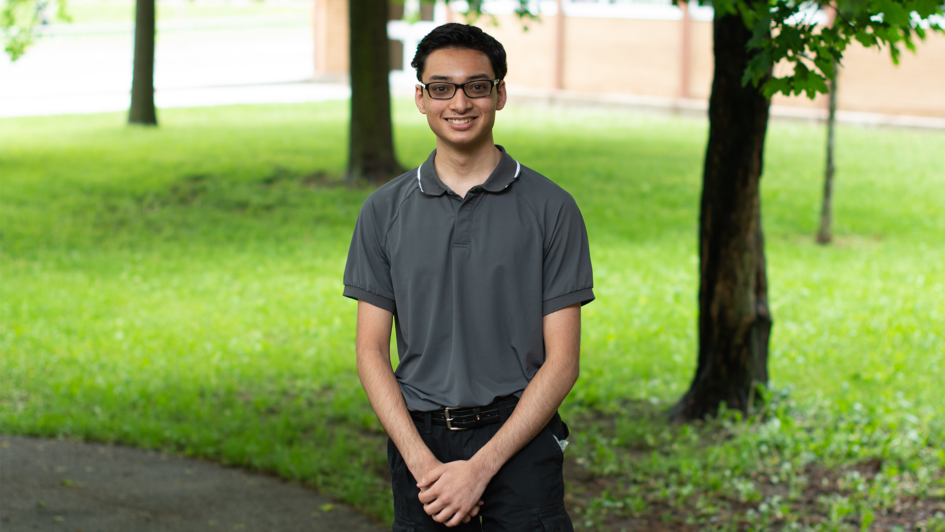
June 15th, 2022
Neil Mitra, a Grade 12 student at Waterloo Collegiate Institute, is aiming to make a global impact with his work to help patients suffering heart attacks. The 18-year-old is the Founder and CEO of Mitra Biotechnologies, a startup company that aims to revolutionize the speed with which heart attacks can be identified and treated.
“We are developing the world’s first multiplex cardiac testing device to allow physicians and healthcare workers to pretty much detect and predict heart attacks at the point of care,” he explained.
For Mitra, this work hits close to home.
“In 2019, I lost my close Aunt due to a heart attack,” said Mitra.
Through this experience, he was inspired to find a way to improve the level of care available to those suffering a heart attack around the world. In May of 2019, he created the concept for his device and filed a provisional patent.
“We realized that the pressing issue is that these doctors are unable to get cardiac biomarkers at the point of care,” said Mitra.
So what does his device do? Built on a small piece of paper, it uses microfluidics and a nanofilter to separate the plasma from whole blood to test for a variety of protein biomarkers related to heart attacks. These biomarkers can tell doctors which part of the heart is being damaged, and allow them to determine the best treatment more quickly. Currently available blood tests are slower by comparison, delaying treatment.
“Right now, it would take you nearly an hour to detect these biomarkers and we can do it in five minutes with our system,” said Mitra. “For cardiac surgeons, time is tissue. Time is the golden elixir for saving a patient’s life.”
Mitra’s vision and outstanding commitment to biotechnology haven’t gone unnoticed. He was recently named a Global Teen Leader. Led by the We Are Family Foundation (WAFF), Global Teen Leaders are selected for their work addressing the 17 United Nations Sustainable Development Goals. Their goal is to support, amplify and mentor “the work of global youth leaders around the world who are crucial to solving the most pressing problems facing our planet.”
ARE YOU READY TO MEET THE 2022 GLOBAL TEEN LEADERS? 🎉🎉🎉
We chose 34 teens for their social good innovations, organizations, projects, and promise for a more equitable and peaceful future! 💫
Learn more: https://t.co/Vg4uNo7I5A#wearefamily #socent #2022GTLs pic.twitter.com/xEDfxHU6du
— We Are (Family Found)ation (@WeAreFamilyFdtn) May 23, 2022
“It was a great and humbling honour,” Mitra said of being selected. He shared his excitement for the upcoming virtual Just Peace Summit and mentorship opportunities that will help to further the work of all involved to address global issues.
“Our generation is going to be the ones trying to solve most of the world’s problems,” said Mitra. “At the end of the day, that’s what education is all about. How can we train the future generation to solve big problems?”
Education has played a key role in his success, Mitra explained. He wanted to share his thanks with all of the educators who have encouraged and supported him, taking a moment to name a few.
“All my AP teachers, from the beginning, have always supported me to pursue science,” said Mitra. “Specifically, I would like to extend thanks to Mrs. McCarl Palmer, as well as Ms. Banit and Mr. Eaton. I definitely owe them a lot of thanks.”
Their ability to get students excited and passionate about learning was what made the biggest difference.
“They make you excited to learn, and I feel like that’s probably the most important thing,” said Mitra. “If your teachers are able to make you excited about the subject you’re learning, you get very interested and intrigued. I greatly appreciate my teachers.”
Though he is currently preparing to set off across the country to attend the University of British Columbia for Engineering, Mitra’s sights remain on the global perspective. With the aim of democratizing healthcare and access to testing worldwide, he is only just getting started.
“We see a lifesaving opportunity in low to middle income countries,” said Mitra. “That’s something which is a great motivator for me.”
Categories: Feature Tags: Healthcare · innovation · Medical · Mitra · technology

